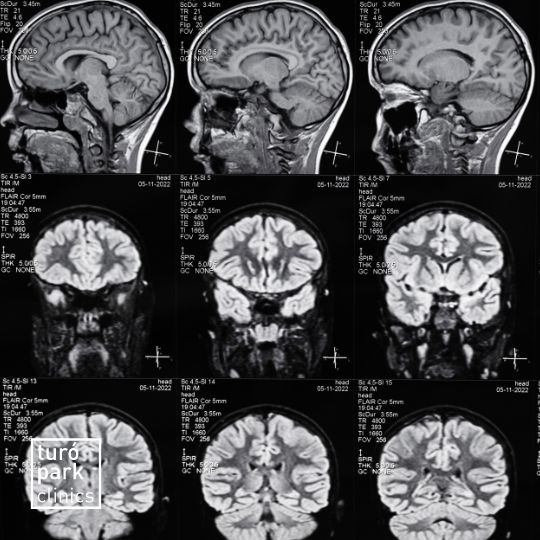Do you suffer from epilepsy?
Epilepsy is a neurological disorder that affects millions of people worldwide and can have a significant impact on their daily lives, routines and personal well-being.
There are several types of epilepsy, which means that the lives of those with epilepsy are affected in different ways. Nevertheless, living with epilepsy can be challenging, but with the right support and treatment many people can lead full and active lives.
At Turó Park Clinics we have specialists in neurology for the effective management of this disease.
What is epilepsy?
Epilepsy is a disease of the nervous system which manifests itself through repeated seizures. These seizures are episodes of electrical activity in the brain that can range from brief, almost imperceptible episodes, to prolonged periods of seizures. The symptoms of the disease can vary depending on the type of seizure and the area of the brain affected.

What are the different types?
The types of epilepsy are classified according to the origin and nature of the seizures.
Also known as partial epilepsy, it originates in and only affects a specific part of the brain. It is usually the most common and the average duration is 1 or 2 minutes. There are 3 types:
Simple focal seizures - the person is conscious and can remember the seizure. Their symptoms depend on the area of the brain affected and may originate in the motor, sensory, autonomic, cognitive or emotional areas of the brain. Depending on the area of origin, the patient may experience uncontrolled or body part movements, strange sensations (such as tingling, dizziness, or hallucinations) and sudden emotional changes.
Complex partial seizures - the person tends to lose consciousness and does not remember the seizure completely. With consciousness they also tend to lose awareness of their surroundings but without losing muscle tone. They usually show a fixed gaze, repetitive movements and automatic behaviours.
Focal seizures with secondary generalisation - occurs when a simple or complex focal seizure spreads to the whole brain. It is important for patients to be informed about the mechanism of seizures and how they start, as this will help the neurologist to know whether the seizures are of focal or localised origin or whole brain at once.
These seizures affect both hemispheres of the brain. They are less common and their duration varies depending on the type of seizure. They are divided into 5 types:
Generalised absence seizures - involve loss of consciousness and loss of connection with the environment. The person usually remains ‘disconnected’ and immobile with a fixed gaze. The average duration is 10-20 seconds and they have a rapid recovery.
Tonic-clonic seizures - have two phases, the tonic phase and the clonic phase. The tonic phase begins with a sudden loss of consciousness with muscle stiffness. This is followed by the clonic phase, which manifests with repetitive seizures in the arms and legs. They last between 1 and 3 minutes and it is important to recognise these seizures, as the affected person may bite their tongue and be injured if there is a fall due to loss of consciousness.
Myoclonic seizures - do not involve unconsciousness and are characterised by sudden, brief jerks of muscles in part or all of the body. They last only a few seconds and tend to be accompanied by other types of seizures.
Atonic seizures - are very brief and last only seconds. They are characterised by a sudden loss of muscle tone, thus causing unexpected falls that can result in more serious injuries. Like myoclonic seizures, they are often accompanied by other seizures.
Tonic seizures - they cause sustained muscle stiffness throughout the body without any other movement. They last between 10 secs and 1 minute.
What are the causes of epilepsy?
The causes of epilepsy can be varied and in many cases, unknown. Some of the most common causes include:
- Genetic causes: some forms of epilepsy are known to be genetically predisposed as there is a genetic mutation that affects the normal functioning of neurons. This mutation is known to be inherited and usually occurs in childhood or adolescence.
- Brain abnormalities and injuries: abnormalities in brain development at birth can result in a lifetime of epilepsy. Injuries, such as severe head trauma or brain tumours, can cause damage to the brain and disrupt its normal functioning, thus causing epilepsy.
- Infectious diseases: infectious diseases of the central nervous system such as meningitis, encephalitis and HIV cause inflammation of the brain, resulting in damage to brain tissue and potentially triggering conditions such as epilepsy.
- Metabolic disorders: metabolic problems, such as cellular energy dysfunctions, hypoglycaemia (low blood glucose) or vitamin and mineral deficiencies, may contribute to the development of this condition.
Nevertheless, in many cases the specific cause of epilepsy cannot be identified.
How is epilepsy diagnosed?
The diagnosis of epilepsy is a process that involves several tests and evaluations to determine the presence of seizures and their causes. It includes a review of the patient's medical history and a complete physical and neurological examination.
EEG (Electroencephalogram) and MRI (Magnetic Resonance Imaging) tests will also be performed to study the electrical activity of the brain and to obtain detailed images of the brain. Laboratory tests and neuropsychological function tests will follow.
Who is recommended to get an examination?
It is recommended to consult an expert if a person presents:
- Unexplained seizures, either single or recurrent
- Problems with coordination, balance or muscle stiffness
- Family history
- Severe head trauma followed by symptoms of epileptic nature
- Illnesses such as encephalitis, meningitis or HIV
- Dementia
- Metabolic imbalances
Your health is our priority.
Our neurologists welcome you for the diagnosis and treatment of epilepsy.

Our specialised neurologist
